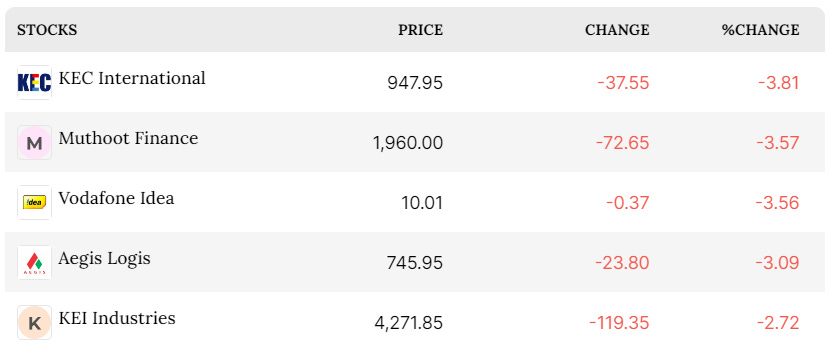What Went Wrong for India’s Digital Education Revolution?
Happy Friday! You’ve worked hard this week, and now it’s time to finish strong. Let’s wrap up the week on a high note, with gratitude for the lessons learned and the opportunities ahead. Your journey is just as important as your destination.
“Gratitude turns what we have into enough”
Gratitude can help reduce the pressure of constantly needing to achieve more, allowing you to focus on the positives in your current situation. By appreciating what you have, you become more mindful of the present, leading to greater clarity and better decision-making.
Gratitude fosters contentment, leading to a more positive outlook, which can boost morale and productivity, especially in business.
Now, let’s get started…
🎯 Top Headlines of the Day
Vodafone Idea share price plummets below ₹10, hits 52-week low
Foreign investors shy away: Bharat stocks now too pricey
Astrotalk doubles FY24 revenue, surges to ₹651 crore
📊 Market Pulse
Today’s top-performing stocks are:
Today’s top-performing stocks are:
The Shocking Downturn in India’s EdTech Market
In recent weeks, you might have noticed a wave of mass layoffs by EdTech startups or even heard of a few shutting down entirely. It’s hard to believe, especially when just a few years ago, EdTech was one of the most promising and booming sectors in India. As of now, we have over 9,000 EdTech startups, big and small, all trying to make their mark.
Back in 2020, the EdTech industry in India was valued at $750 million, and by 2025, it was expected to explode into a $4 billion industry. In 2021 alone, it became the third most funded sector in India.
So, what happened? Why did companies like Vedantu suddenly lay off 600 employees, Unacademy let go of 1,000, and Byju’s saw more than 800 people leave?
It’s not just layoffs, either. Some well-funded EdTech startups had to shut down operations completely. And it makes you wonder: if the sector was doing so well, why did things start to go downhill so quickly?
Why did investors stop pouring money into these companies?
To understand this, let’s rewind and look at how the EdTech sector skyrocketed in the first place.
The Boom: How It All Started
The EdTech industry began to thrive when the internet became more accessible. Suddenly, anyone could create a video course and sell it online. It was much cheaper than running physical coaching centers, which required heavy investment in infrastructure. The online model became an economical option, not just for EdTech companies but also for students and parents. For instance, while physical coaching for grades 11 and 12 might cost you INR 1-2 lakhs, online coaching could offer similar courses at a fraction of that cost.
Then came the lockdown. Schools and coaching centers were forced to shut down, and the only alternative was online learning. With 580 million people in India between the ages of 5-24 (the core education market), EdTech companies swooped in. From competitive exam preparation to K-12 education, these startups offered it all. They even expanded into skill development courses at affordable rates.
This rapid expansion caught the attention of investors.
Companies like Byju’s, Vedantu, and Unacademy saw massive growth.
Byju’s alone registered around 115 million students, while Vedantu had 200,000 paying students.
Platforms like EduKart partnered with top institutions like NMIMS and the London School of Business, offering degrees and diplomas recognized by UGC. India became one of the world’s largest consumers of online education.
With this surge in demand, investors saw a goldmine and started pumping money into EdTech startups. In 2021, the sector received a whopping $4.7 billion in venture capital funding, making it the third-most funded industry in India. Byju’s alone raised $1.9 billion! Companies like Byju’s, Unacademy, and upGrad became unicorns, which are startups valued at over $1 billion.
The Downfall: What Went Wrong?
Here’s where things started to unravel. These EdTech companies were burning through cash, spending huge amounts on marketing to acquire and retain customers. But there was a twist.
Startups like Apni Kaksha and Physics Wallah were thriving without spending much on marketing at all. Why? They had something priceless: trust.
Aman Dhattarwal of Apni Kaksha and Alakh Pandey, the founder of Physics Wallah, have been creating free educational content for years. People knew them, trusted them, and were more than willing to pay for their courses. They didn’t need flashy marketing campaigns. Their consistent content creation built a loyal community of students who admired them, making customer acquisition easy and cost-effective.
In contrast, companies that relied heavily on paid marketing started to struggle as the market became oversaturated. The low entry barrier to online education meant that new players were entering the space rapidly, intensifying competition. This drove up the cost of acquiring new customers, which started cutting into profits.
Then came the global economic downturn, and investors became cautious. Y Combinator, one of the world’s leading startup accelerators, even issued a letter advising founders to “survive” the downturn by focusing on profitability. This meant that startups needed to achieve profitability with the resources they had without relying on fresh funding.
However, many EdTech startups were not prepared for this shift. They had become too dependent on external funding. When investors pulled back, companies like Lido and Udayy couldn’t raise more capital in time and were forced to shut down. Others, like Byju’s, Vedantu, and Unacademy, had to cut costs drastically, leading to mass layoffs.
So, What’s Next for EdTech?
It’s clear now that the hyper-growth, high-burn model many EdTech startups follow isn’t sustainable. They were burning cash at a rate that was only manageable as long as new funding kept coming in. With funding drying up, they’re scrambling to cut costs and survive.
So, is this the end of India’s EdTech boom? Not necessarily. There’s a growing realization that the future may lie in hybrid models—combining physical coaching centers with online support. Companies like Physics Wallah and Unacademy have already started setting up learning centers. This could be the next step in balancing the cost-efficiency of online education with the personal touch of in-person learning.
To truly thrive, EdTech companies need to innovate. They need to think outside the box and come up with sustainable solutions that don’t rely solely on burning through cash to grow. Better internet connectivity, affordable tech for students, and practical, well-trained teachers are all steps in the right direction.
It’s going to be interesting to see which EdTech startups learn these lessons and rise to the challenge. Will they adapt and evolve, or will the bubble burst completely? Only time will tell.
So, what do you think? Is the EdTech bubble bursting? Drop your thoughts in the comments.
BTW, if you want to do something productive during your time off, check this out 👉
In partnership with
Unlock the future of problem-solving with Generative AI!
If you're a professional looking to elevate your strategic insights, enhance decision-making, and redefine problem-solving with cutting-edge technologies, the Consulting in the Age of Gen AI course is your gateway. Perfect for those ready to integrate Generative AI into your work and stay ahead of the curve.
In a world where AI is rapidly transforming industries, businesses need professionals and consultants who can navigate this evolving landscape. This learning experience arms you with the essential skills to leverage Generative AI for improving problem-solving, decision-making or advising clients.
Join us and gain firsthand experience in how state-of-the-art technology can elevate your problem-solving skills using GenAI to new heights. This isn’t just learning; it’s your competitive edge in an AI-driven world.
Check out the course here - Consulting in the age of Gen AI
That’s it for today, folks! We will be back again next week with more valuable insights about ‘Bharat in Business.’ Till then, stay informed!






